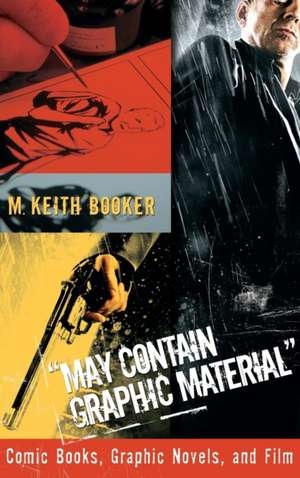May Contain Graphic Material: Comic Books, Graphic Novels, and Film
Autor Prof. M. Keith Bookeren Limba Engleză Hardback – 29 oct 2007 – vârsta până la 17 ani
Preț: 309.07 lei
Preț vechi: 359.12 lei
-14% Nou
Puncte Express: 464
Preț estimativ în valută:
59.14€ • 63.24$ • 49.31£
59.14€ • 63.24$ • 49.31£
Carte tipărită la comandă
Livrare economică 17 aprilie-01 mai
Preluare comenzi: 021 569.72.76
Specificații
ISBN-13: 9780275993863
ISBN-10: 0275993868
Pagini: 256
Dimensiuni: 156 x 235 x 25 mm
Greutate: 0.55 kg
Editura: Bloomsbury Publishing
Colecția Praeger
Locul publicării:New York, United States
ISBN-10: 0275993868
Pagini: 256
Dimensiuni: 156 x 235 x 25 mm
Greutate: 0.55 kg
Editura: Bloomsbury Publishing
Colecția Praeger
Locul publicării:New York, United States
Notă biografică
M. Keith Booker is Professor of English at the University of Arkansas. He is the author of numerous articles and books on modern literature, literary theory, television, and film including Monsters, Mushroom Clouds, and the Cold War (2001), Strange TV: Innovative Television Series from The Twilight Zone to The X-Files (2002), Science Fiction Television (2004), Alternate Americas: Science Fiction Film and American Culture (2006), Drawn to Television: Prime-Time Animation from The Flintstones to Family Guy (2006), From Box Office to Ballot Box: The American Political Film (2007), and Postmodern Hollywood (2007).
Recenzii
This entertaining study of the interactions between various media starts with Superman: The Movie (1978) and concludes with such recent work as 300, Spider-Man 3, Ghost Rider, and Fantastic Four: Rise of the Silver Surfer. Booker has a broad knowledge of his field. In 15 chapters he touches on some very interesting work--e.g., the Batman films, Ghost World, Road to Perdition, American Splendor, Sin City--analyzing many films in depth and mentioning others in his lengthy introduction. Many scholars have commented on some of these films, but this reviewer cannot think of anyone else who deals with them in such detail. For example, Booker may be the first critic to note that Howard the Duck (1986)--a film that became a synonym for failure--actually made a small profit when the international receipts were counted in. Even readers with a preference for highly developed characters in meaningful historic plot situations will acknowledge Booker's expertise. One cannot help but note the impact on popular culture of the films he reels off. Recommended. All readers, all levels.








